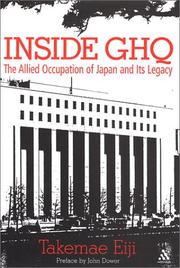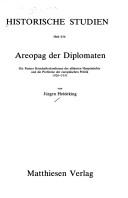| Listing 1 - 10 of 15 | << page >> |
Sort by
|
Book
Year: 1971 Publisher: [Fleurus : Bietlot Frères,
Abstract | Keywords | Export | Availability | Bookmark
 Loading...
Loading...Choose an application
- Reference Manager
- EndNote
- RefWorks (Direct export to RefWorks)
Supreme Headquarters, Allied Powers, Europe --- Allied Forces

ISBN: 0826462472 Year: 2002 Publisher: New York (N.Y) Continuum
Abstract | Keywords | Export | Availability | Bookmark
 Loading...
Loading...Choose an application
- Reference Manager
- EndNote
- RefWorks (Direct export to RefWorks)
Supreme Commander for the Allied Powers. --- Japan --- History
Book
Year: 1930 Publisher: Paris, Kaunas (Lithuanie) É. Duchemin, L. Chauny & L. Quinsac, successeurs; Spaudos fondas,
Abstract | Keywords | Export | Availability | Bookmark
 Loading...
Loading...Choose an application
- Reference Manager
- EndNote
- RefWorks (Direct export to RefWorks)
World War, 1914-1918 --- Territorial questions --- Allied powers (1919- ). --- Poland --- Lithuania --- Vilnius (Lithuania) --- Foreign relations

ISBN: 9783486583984 Year: 2007 Publisher: München Oldenbourg
Abstract | Keywords | Export | Availability | Bookmark
 Loading...
Loading...Choose an application
- Reference Manager
- EndNote
- RefWorks (Direct export to RefWorks)
German reunification question (1949-1990) --- Stalin, Joseph, --- Allied Powers (1919- ) --- Austria --- Germany --- Soviet Union --- History --- Foreign relations
Book
Year: 1918 Publisher: Paris : Paul,
Abstract | Keywords | Export | Availability | Bookmark
 Loading...
Loading...Choose an application
- Reference Manager
- EndNote
- RefWorks (Direct export to RefWorks)
Armies --- International relations --- World War, 1914-1918 --- World War, 1914-1918. --- History --- Campaigns. --- Photography. --- Allied Forces --- Allied Powers (1919- ) --- Organization --- History.
Book
Year: 2015 Publisher: Carlisle, PA : Strategic Studies Institute and U.S. Army War College Press,
Abstract | Keywords | Export | Availability | Bookmark
 Loading...
Loading...Choose an application
- Reference Manager
- EndNote
- RefWorks (Direct export to RefWorks)

ISBN: 3786814368 9783786814368 Year: 1979 Volume: 436 Publisher: Husum: Matthiesen,
Abstract | Keywords | Export | Availability | Bookmark
 Loading...
Loading...Choose an application
- Reference Manager
- EndNote
- RefWorks (Direct export to RefWorks)
World War, 1914-1918 --- Territorial questions --- Allied Powers (1919- ) --- History --- Treaty of Versailles --- Europe --- Politics and government --- -European War, 1914-1918 --- First World War, 1914-1918 --- Great War, 1914-1918 --- World War 1, 1914-1918 --- World War I, 1914-1918 --- World War One, 1914-1918 --- WW I (World War, 1914-1918) --- WWI (World War, 1914-1918) --- History, Modern --- Allied Powers (1919- ). Conference of Ambassadors --- -History --- Council of Europe countries --- Eastern Hemisphere --- Eurasia --- -World War, 1914-1918 --- -Territorial questions --- Allied Powers (1919- ). --- History. --- Treaty of Versailles (1919) --- World War, 1914-1918 - Territorial questions --- Europe - Politics and government - 1918-1945
Book
ISBN: 178533249X 1785332481 178920531X Year: 2016 Publisher: New York, [New York] ; Oxford, [England] : berghahn,
Abstract | Keywords | Export | Availability | Bookmark
 Loading...
Loading...Choose an application
- Reference Manager
- EndNote
- RefWorks (Direct export to RefWorks)
"Politically adrift, alienated from Weimar society, and fearful of competition from industrial elites and the working class alike, the independent artisans of interwar Germany were a particularly receptive audience for National Socialist ideology. As Hitler consolidated power, they emerged as an important Nazi constituency, drawn by the party's rejection of both capitalism and Bolshevism. Yet, in the years after 1945, the artisan class became one of the pillars of postwar stability, thoroughly integrated into German society. From Craftsmen to Capitalists gives the first account of this astonishing transformation, exploring how skilled tradesmen recast their historical traditions and forged alliances with former antagonists to help realize German democratization and recovery; 'Among historians, German Handwerker have typically been treated only in terms of their presumed Nazi sentiments or persistent economic backwardness. This extensively researched, well-written volume shows that these artisans were neither exclusively reactionary in their politics nor cynically sacrificed by the Nazis at the altar of the war economy'--Jay Lockenour, Temple University; 'This is an impressive study that bears directly upon important scholarly debates. McKitrick's sympathy for the plight of tradespeople in a rapidly changing society is palpable, and he rightly handles their history with a due consideration of its complexity, rather than treating them as reactionary caricatures'--Perry Biddiscombe, University of Victoria"--From publisher's website.
Artisans --- Handicraft industries --- Social change --- National socialism --- Democratization --- History --- Political activity --- History. --- Germany --- Economic conditions --- Politics and government --- 1900s. --- 20th century. --- allied powers. --- allies. --- apprentice. --- artisan. --- bolshevik. --- capitalism. --- carpenters. --- competition. --- contemporary. --- cooperatives. --- democracy. --- economy. --- elections. --- european history. --- free market. --- germany. --- history buff. --- history major. --- hitler. --- ideology. --- modern history. --- nazi. --- political. --- politics. --- postwar. --- recovery. --- skilled. --- socialist. --- society. --- tradesman. --- transformation. --- wartime. --- working class. --- world history. --- world war. --- wwii.
Book
ISBN: 223300034X 9782233000347 Year: 1977 Volume: 8 Publisher: Paris: Pedone,
Abstract | Keywords | Export | Availability | Bookmark
 Loading...
Loading...Choose an application
- Reference Manager
- EndNote
- RefWorks (Direct export to RefWorks)
World War, 1914-1918 --- Première guerre mondiale --- Reparations --- Réparations --- Allied Powers (1919- ) --- France --- Germany --- Allemagne --- Relations --- Foreign relations --- Economic conditions --- Relations extérieures --- Conditions économiques --- 327 --- -European War, 1914-1918 --- First World War, 1914-1918 --- Great War, 1914-1918 --- World War 1, 1914-1918 --- World War I, 1914-1918 --- World War One, 1914-1918 --- WW I (World War, 1914-1918) --- WWI (World War, 1914-1918) --- History, Modern --- Buitenlandse betrekkingen. Buitenlandse politiek. Internationale betrekkingen. Internationale politiek. Wereldpolitiek --- Allied Powers (1919- ). Reparation Commission --- -Foreign relations --- -Relations --- -World War, 1914-1918 --- Reparations. --- -Buitenlandse betrekkingen. Buitenlandse politiek. Internationale betrekkingen. Internationale politiek. Wereldpolitiek --- -327 --- 327 Buitenlandse betrekkingen. Buitenlandse politiek. Internationale betrekkingen. Internationale politiek. Wereldpolitiek --- Première guerre mondiale --- Réparations --- Relations extérieures --- Conditions économiques --- Weimar Republic --- Germanii︠a︡ --- Германия --- BRD --- FRN --- Jirmānīya --- جرمانيا --- Nimechchyna --- Gjermani --- Federalʹna Respublika Nimechchyny --- Veĭmarskai︠a︡ Respublika --- Ashkenaz --- Germanyah --- Bundesrepublik Deutschland --- Federal Republic of Germany --- Deutschland --- Repoblika Federalin'i Alemana --- República Federal de Alemania --- Alemania --- República de Alemania --- Bu̇gd Naĭramdakh German Uls --- Kholboony Bu̇gd Naĭramdakh German Uls --- KhBNGU --- ХБНГУ --- German Uls --- Germania --- Republika Federal Alemmana --- Deutsches Reich --- Grossdeutsches Reich --- Weimarer Republik --- Vācijā --- Pʻŭrangsŭ --- Frankrig --- Francja --- Frant︠s︡ii︠a︡ --- Prantsusmaa --- Francia (Republic) --- Tsarfat --- Tsorfat --- Franḳraykh --- Frankreich --- Fa-kuo --- Faguo --- Франция --- French Republic --- République française --- Peurancih --- Frankryk --- Franse Republiek --- Francland --- Frencisc Cynewīse --- فرنسا --- Faransā --- Franza --- Republica Franzesa --- Gallia (Republic) --- Hyãsia --- Phransiya --- Fransa --- Fransa Respublikası --- Franse --- Францыя --- Frantsyi︠a︡ --- Французская Рэспубліка --- Frantsuzskai︠a︡ Rėspublika --- Parancis --- Pransya --- Franis --- Francuska --- Republika Francuska --- Bro-C'hall --- Френска република --- Frenska republika --- França --- República Francesa --- Pransiya --- Republikang Pranses --- Γαλλία --- Gallia --- Γαλλική Δημοκρατία --- Gallikē Dēmokratia --- فرانسه --- Farānsah --- צרפת --- רפובליקה הצרפתית --- Republiḳah ha-Tsarfatit --- פראנקרייך --- 法国 --- 法蘭西共和國 --- Falanxi Gongheguo --- フランス --- Furansu --- フランス共和国 --- Furansu Kyōwakoku --- Francija --- Ranska --- Frankrike --- Allied Powers Reparation Commission --- Allied Powers (1919- ). --- World War, 1914-1918 - Reparations --- France - Relations - Germany --- Germany - Relations - France --- France - Foreign relations - 1914-1940 --- France - Economic conditions - 1918-1945 --- Ruhr (allemagne) --- Conditions economiques --- Relations diplomatiques --- Histoire --- 1918-1945 --- 20e siecle --- 1921-1923
Book
ISBN: 3863950615 9783863950613 Year: 2012 Publisher: Universitätsverlag Göttingen
Abstract | Keywords | Export | Availability | Bookmark
 Loading...
Loading...Choose an application
- Reference Manager
- EndNote
- RefWorks (Direct export to RefWorks)
The contributions of this book are the results of a conference of the German Academic Exchange Service (DAAD) in March 2011. The underlying consideration was simple: In language teaching and cultural studies, media are essential - why not resort to historical sources? They can be used in many ways, have a high recognition value and offer innumerable points of contact to the topics of regional and media studies. First, relevant experts present the most important collections and portals on the Internet and enter into the question of the informative and practical value of historical sources. The second part deals in a more detailed manner with aural sources, movies, political cartoons and posters as well as street names and texts of worker literature. Die Beiträge des vorliegenden Bandes gehen auf eine Fachtagung des Deutschen Akademischen Austauschdienstes (DAAD) im März 2011 zurück. Ihr lag eine simple Überlegung zugrunde: Im Sprach- und Landeskundeunterricht sind Medien unerlässlich – warum nicht auf historische Quellen zurückgreifen? Sie sind vielseitig einsetzbar, haben einen hohen Wiedererkennungswert und bieten unzählige Anknüpfungspunkte an landeskundliche und medienwissenschaftliche Themen. Die Beiträge einschlägiger Fachwissenschaftler stellen zunächst die wichtigsten Sammlungen und Portale im Internet vor und fragen nach Aussagekraft und Praxiswert historischer Quellen. Eingehender behandelt werden sodann die Quellen Tondokument, Spielfilm, Karikatur und Plakat sowie Straßennamen und Texte der Arbeiterliteratur.
German language --- Mass media and language --- Mass media. --- Ashkenazic German language --- Hochdeutsch --- Judaeo-German language (German) --- Judendeutsch language --- Judeo-German language (German) --- Jüdisch-Deutsch language --- Jüdischdeutsch language --- Germanic languages --- Mass communication --- Media, Mass --- Media, The --- Communication --- Study and teaching (Higher) --- Foreign speakers --- Study and teaching --- Deutsch. --- Deutschunterricht. --- Fremdsprache. --- German language. --- Mass media --- Quelle. --- Foreign speakers. --- Germany. --- Language and languages --- Conference --- German Academic Exchange Service (DAAD) --- Language and culture classes --- Media --- Historical sources --- Deutsche Partei --- Frédéric Déhu --- Hauptquartier --- Hitlerjugend --- Regional-Express --- Schallplatte --- Supreme Commander for the Allied Powers
| Listing 1 - 10 of 15 | << page >> |
Sort by
|

 Search
Search Feedback
Feedback About UniCat
About UniCat  Help
Help News
News